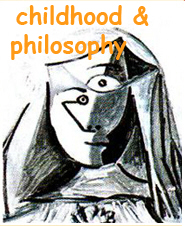pupils’age and philosophical praxis: two factors that influence the development of critical thinking in children
Keywords:
Philosophy for children, Dialogical critical thinking, Epistemological perspectives, Preschool and Elementary schoolAbstract
One of the fundamental objectives of Philosophy for Children (P4C) is the cognitive development of elementary and secondary school pupils. In this text, we examine to what extent the age of the children and the number of years of praxis in P4C influence the development of their critical thinking. To do so we used, as an analysis grid, the model of the developmental process of dialogical critical thinking that emerged from the analysis of transcripts of exchanges among pupils aged 4 to 12 years (Daniel et al., 2005; Daniel & Gagnon, 2011). The content analyzed was the “philosophical” exchanges among pupils. Participants were 13 groups of pupils from preschool to the end of elementary school. These groups originated from two schools, one in Quebec and one in Ontario. At the time the data were collected, the Quebec school groups had one year of P4C praxis, whereas the Ontario school groups had two years of praxis. Results indicate that children’s age and number of years of philosophical praxis are among the factors that influence the developmental process of critical thinking.Downloads
Download data is not yet available.
Downloads
Published
2012-06-10
Issue
Section
articles



